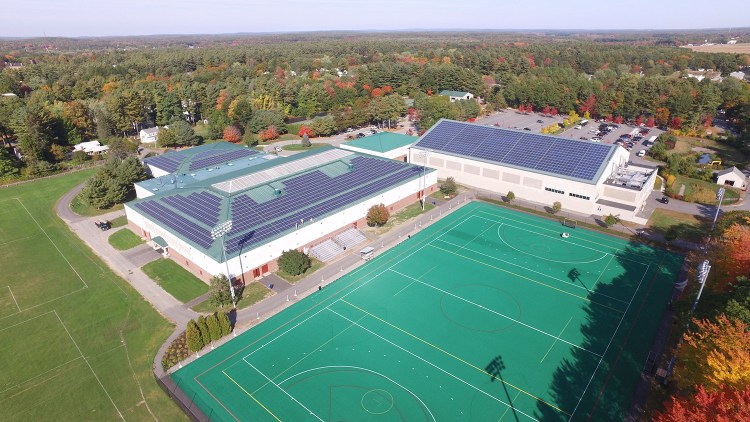Bowdoin College announced Thursday it is now carbon neutral, two years ahead of schedule.
The milestone means the Brunswick campus’ net impact on carbon dioxide emissions is calculated to be zero, the result of reduced fossil fuel use together with investments to encourage enough renewable energy production to offset the school’s remaining emissions.
Bowdoin is one of hundreds of colleges around the country that have achieved that goal or are working toward it. Other schools in Maine – including College of the Atlantic in Bar Harbor and Colby College – have also reached carbon neutral status.
Since 2008, Bowdoin reported a 29 percent reduction in emissions of carbon, which is a byproduct of burning fuel. That change was driven by campus energy products, such as switching buildings from oil to natural gas, and installing a cogeneration turbine, which produces electricity as a by-product of generating heat.
Looking ahead, Bowdoin has also joined four other liberal arts colleges to support the construction of a nearly $100 million solar project in western Maine.
“Today at Bowdoin, we celebrate the dual milestones of carbon neutrality and this promising and innovative solar project with our partner colleges from Massachusetts, but we are far from done,” said Bowdoin College President Clayton Rose in a release Thursday.
“In the coming year, we will be working with members of our campus community to put forward ambitious new plans at the College focused on greater sustainability achievements and environmental stewardship. In the meantime, it is a point of great pride that Maine will be home to this new source of clean solar energy and, that for the second time in recent years, Bowdoin is helping to establish the largest solar facility in our state.”
In 2007, Bowdoin’s leadership signed the American College & University Presidents Climate Commitment, setting a goal to reach carbon neutrality by 2020.
“By achieving carbon neutrality two years ahead of schedule, Bowdoin College is demonstrating the leadership and innovation needed to help meet the shared goals of the Climate Leadership Network,” said Tim Carter, president of Second Nature, the organization that monitors progress on the Presidents’ Climate Leadership Commitments.
Today, the number of schools in the network is more than 600, including 15 of Maine’s approximately 30 colleges. Some claim to have already achieved that goal. For example, the College of the Atlantic in Bar Harbor was the first school in the United States to achieve climate neutrality in 2007 and Colby College in Waterville was the fourth in 2013.
“Not only are we deeply concerned about the increasing pace and intensity of global climate change and the potential for unprecedented detrimental impacts, but we also understand that technology, infrastructure, global interconnectedness, and our greatest asset – engaged, committed, smart students – allow us to explore bold and innovative solutions and to lead in climate action and sustainable solutions,” the Climate Leadership Statement on the group’s website reads.
Many changes at Bowdoin involved campus infrastructure. The cogeneration turbine now provides about 6 percent of total campus electricity consumption, enough to power 137 homes in Maine. Other projects included converting nearly 50 buildings from oil to natural gas, insulating underground steam tunnels and weatherizing campus buildings and upgrading light bulbs to LEDs. The school installed 48 solar hot water panels at Thorne Hall, and in 2014, it developed a 1.2-megawatt solar power complex in Brunswick.
Now, Bowdoin has purchased renewable energy credits to help fund NextEra Energy’s construction of a 75-megawatt solar project in Farmington. Four other colleges – Amherst, Hampshire, Smith, and Williams – are involved in that project. The facility will be the largest solar array in the state when it goes online next year.
Colleges such as Bowdoin calculate how much fossil fuel use is avoided because of their investments in the project, then subtract that credit from their own energy use to get closer to net zero, or carbon neutrality.
“While we continue to aggressively pursue energy efficiency projects on our campus, it is exciting to play a role in the expansion of solar energy and green jobs in Maine,” said Matthew Orlando, Bowdoin’s senior vice president for finance and administration and treasurer. “Working with our peer schools demonstrates the need for collaborative partnerships to address climate change.”
Megan Doyle can be contacted at 791-6327 or at:
mdoyle@pressherald.com
Twitter: megan_e_doyle
Send questions/comments to the editors.



Success. Please wait for the page to reload. If the page does not reload within 5 seconds, please refresh the page.
Enter your email and password to access comments.
Hi, to comment on stories you must . This profile is in addition to your subscription and website login.
Already have a commenting profile? .
Invalid username/password.
Please check your email to confirm and complete your registration.
Only subscribers are eligible to post comments. Please subscribe or login first for digital access. Here’s why.
Use the form below to reset your password. When you've submitted your account email, we will send an email with a reset code.